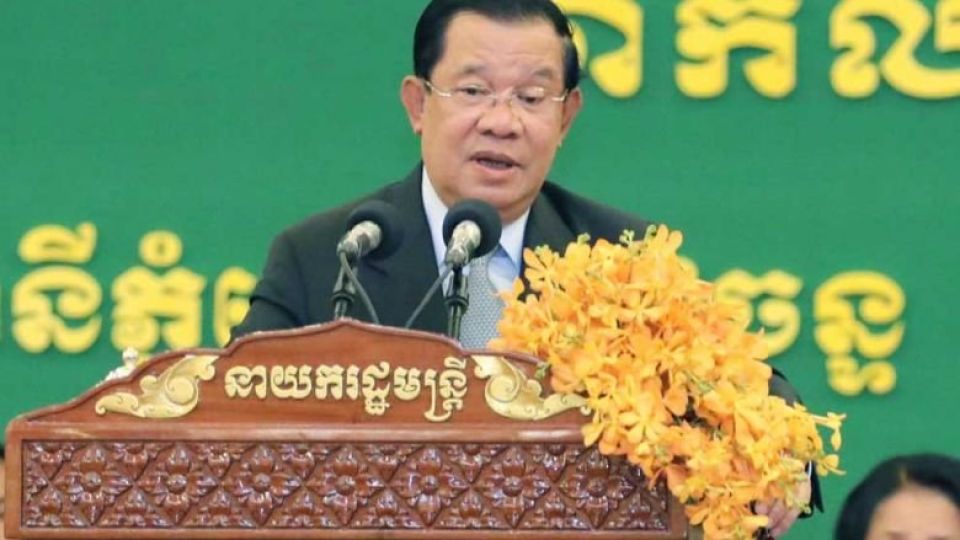June 6, 2023
PHNOM PENH – ASIA is becoming a dangerous geopolitical hotspot, with several countries announcing that they intend to send naval vessels towards Southeast Asia and on to the South China Sea, warned Prime Minister Hun Sen.
“Heated geopolitical issues can easily escalate, namely to war. I am not just referring to the war between Russia and Ukraine, as there are rising tensions in Southeast Asia. For the time being, there are a number of nations that are intending to send their navies into the South China Sea,” he noted.
Addressing the June 5 graduation ceremony of the Royal University of Law And Economics in Phnom Penh, he said a recent alliance between the US, UK and Australia (AUKUS), which involved the purchase of nuclear submarines was becoming a particular concern to the ASEAN nations, particularly as the bloc has declared itself a non-nuclear zone.
“We oppose nuclear proliferation. Even if it does not carry any accident risk, it is the starting point of a dangerous arms race. In my opinion, if this situation continues, the world will face a great danger,” he warned.
“However, we still have the will to find a way for all parties to reconcile with one another, especially with regards to the tensions between the US and China. We must employ every available method to manage this relationship,” he added.
He noted that even though the Cold War had ended, there were still geopolitical tensions in the world that he feared could lead to armed exchanges.
“NATO used to be focused on the west, but seems to be turning its gaze to the Asia-Pacific region, under the disguise of its ‘concerns’,” he added.
Yang Peou, secretary-general of the Royal Academy of Cambodia, told The Post on June 5 that the region has become a heated point of geopolitical competition for influence between the world’s superpowers. He believed the competition could be linked to the rise of China as a major superpower, contrary to US expectations.
“The geopolitical competition in our region is due to the superpowers. On behalf of the countries in the region, we need to see the issues clearly, and work to maintain the balance of their influence,” he said.
“We have to balance our foreign policies, without showing a particular proclivity towards any one side, as doing so the Cold War ultimately led to the near-destruction of Cambodia.
Our international politics at this time must be strong and flexible, so that we can adapt to the practical realities of the geopolitical competition,” he explained.
He added that tensions had recently escalated when the members of the Quadrilateral Security Dialogue (QUAD) – the US, Australia, India and Japan – showed their willingness to exert greater influence in the region.
“In particular, when Australia cancelled an agreement to purchase diesel-electric submarines from France in order to purchase nuclear submarines from the US – to confirm the QUAD alliance – it suggested a nuclear escalation,” he said.
“The purchase of nuclear submarines suggests a willingness to increase the use of nuclear technology in the region. This is a dangerous precedent for the region and the world alike,” he added.
Hun Sen also discussed the Myanmar crisis, noting that the situation had worsened beyond the scope of the ASEAN five-point consensus, which required the immediate cessation of violence and increased dialogue, humanitarian assistance and mediation. He was of the opinion that Myanmar appeared to be gradually moving towards a civil war.
“At the recent ASEAN Summit, I said that we needed to update the earlier consensus, as it seemed unlikely that a cessation of violence was a possibility,” he said.
“In some parts of Myanmar, attacks are ongoing, while several self-proclaimed central governments are fighting full-scale battles with each other. Smaller states are strengthening themselves, in an attempt to declare independence. Based on my observations from afar, the war will be prolonged,” he added.
He said that the situation was as complicated as that which Cambodia had faced in the past.
“Cambodia was fortunate, in that it found peace through a win-win policy. Unfortunately, there is no guarantee that the policy that was so successful in the Kingdom will be applicable to Myanmar,” he stressed.


